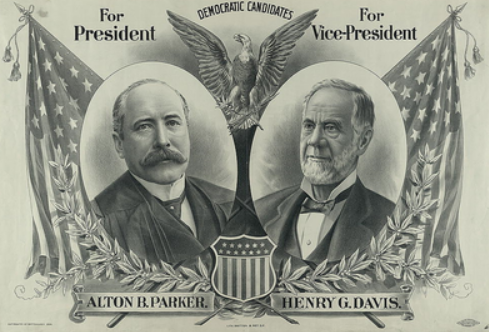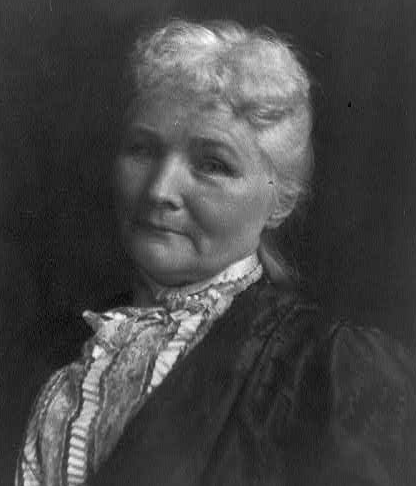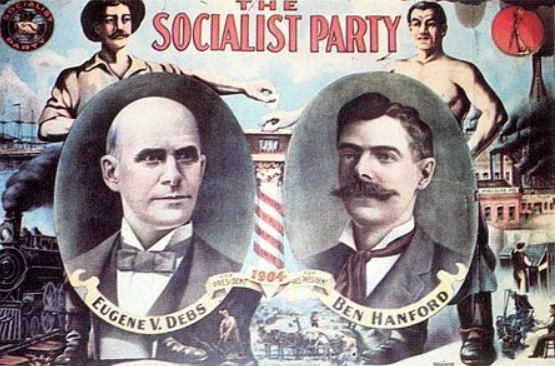There are no limits to which
powers of privilege will not go
to keep the workers in slavery.
-Mother Jones
Hellraisers Journal, Friday October 7, 1904
Presidential Campaigns:
Davis Authored Injunction Used Against Mother Jones

According to an article published in The Union of Indianapolis, and republished by The Western Laborer of Omaha, and thence by The Post-Standard, Henry G. Davis of West Virginia, candidate of the Democratic Party for the office of Vice-President of the United States, was the author of Judge Jackson’s injunction which led to that judge’s famous confrontation with Mother Jones. We suspect that Davis also had a hand in the injunction which led to the slaughter of the miners of Raleigh County in West Virginia. We are unable to prove that connection at this time, but we will certainly be looking for more information regarding Davis’ coal mines in West Virginia and the Massacre of the Raleigh County Miners.
From today’s edition of The Post-Standard of Syracuse, New York:
WHAT DAVIS STANDS FOR.
———-
Private Interests of the Man Who Is
“Against the Trusts.”
———-The Western Laborer Omaha.
“I beg my countrymen as they value their liberty, to watch with a zealous eye the tendency of the many to centralize power in the hands of the few.”-Henry G. Davis
Here is the record of Davis, as published by The Union, printed at Indianapolis:
When Mr. Davis began operating mines, he issued and edict that no member of a labor union should be employed in any of his mines or on any of his roads. He has broken up the coal miners’ union along the lines of his roads where and whenever they have been organized. Mr. Davis evicted every union man and his family from the company houses blacklisted them and notified merchants that if favors were shown them or credit extended to them, their own credit would be shut off at his bank. He refused to haul the coal over his road that was mined by union miners, executing a complete boycott over union operators by refusing to place cars at their mines to be loaded.
He has used the courts and injunctions against unions and has even resorted to the bloodhounds, complaining that he had been denied the use of such weapons when the slaves over which he wielded the lash were given their liberty in Lincoln’s proclamation. He is the author of the famous injunction issued by Judge Jackson which imprisoned all the miners who attended meetings including Mother Jones, who addressed the audiences and our own Mr. Blakeley of Linton, Ind, a highly respected delegate to the Indiana Federation of Labor who was organizing in the West Virginia field, who served three years in Parkersburg jail. Davis is the author of the summons papers served upon W. B. Wilson, secretary treasurer of the United Mine Workers, in connection with the same cases that were enjoined which included an injunction against Wilson sending money to the starving families of the miners kicked out of the Davis houses.
Who is Henry Gassaway Davis?
A director of the Standard Oil monopoly, president of three railroads, owner and president of a bank and owner of more than half the coal mines of West Virginia.
A fine candidate for the party that is “against the trusts and a friend of the working man.”
———-
[Photograph and paragraph break added.]
From today’s Osawatomie Graphic of Kansas:
A great many of the Bryan democrats are going to vote for Eugene Debs this year. We are not laying this down as an absolute, dead, moral certainty. It is merely our belief. They are dissatisfied with the reorganization of the democratic party upon a goldburg basis. They have fought Belmont, Morgan and eastern plutocracy so vigorously that they cannot see their way clear to unite with them in the support of Mr. Parker upon a platform dictated by Wall street. Many of them will support Debs and wait till the party of their choice quits gambling in politics with its principles for stakes. Many more of them will vote outright for Mr. Roosevelt, because they know just where he stands on every great moral and political issue.
[Photograph added.]
SOURCES
The Post-Standard
(Syracuse, New York)
-of Oct 7, 1904
https://www.newspapers.com/image/9105514/
Osawatomie Graphic
(Osawatomie, Kansas)
-of Oct 7, 1904
https://www.newspapers.com/image/67887316/
IMAGES
1904 Democratic Campaign Poster, Parker and Davis
https://en.wikipedia.org/wiki/United_States_presidential_election,_1904
Mother Jones, no smile, by B Howell (Mrs Mailly), LOC ab 1902
http://www.loc.gov/pictures/item/2005690040/
SPA Ticket Debs and Hanford, 1904
https://en.wikiquote.org/wiki/Eugene_V._Debs
See also:
US Presidential Election of 1904
https://en.wikipedia.org/wiki/United_States_presidential_election,_1904
Henry Gassaway Davis
https://en.wikipedia.org/wiki/Henry_Gassaway_Davis
WE NEVER FORGET
Feb 23, 1903 Raleigh County WV
Mother Jones and the Massacre of the Raleigh County Miners
For more on Henry Gassaway Davies, Judge Jackson & WV 1902 & 1903
Everybody’s Magazine, Volume 28
North American Company, 1913
https://books.google.com/books?id=3Z7PAAAAMAAJ
EM May 1913
https://play.google.com/books/reader?id=3Z7PAAAAMAAJ&printsec=frontcover&output=reader&hl=en&pg=GBS.PA579
“Sweet Land of Liberty by M. Michelson”
https://play.google.com/books/reader?id=3Z7PAAAAMAAJ&printsec=frontcover&output=reader&hl=en&pg=GBS.PA615
-“West Virginia Under King Coal”
https://play.google.com/books/reader?id=3Z7PAAAAMAAJ&printsec=frontcover&output=reader&hl=en&pg=GBS.PA616
SWEET LAND of LIBERTY!
FEUDALISM and CIVIL WAR in the UNITED STATES of AMERICA,
NOW
By M. Michelson
[…..]
WEST VIRGINIA UNDER KING COAL
As may be imagined, the course of events [Martial Law and Court Martial proceedings used to crush the WV strike of 1912-1913] was not displeasing to the mine-owners who had brought in both guards and “dumdum” bullets.
The militia was on hand to enforce the law. The miners had undoubtedly broken it. Now, despite various assumptions to the contrary, large bodies of men—say, bodies five thousand strong—do not get together and break the law for diversion. Such events are commonly the result of one thing—a condition which has caused men to lose faith in the law. Given these conditions, every man is a potential lawbreaker.
For more than twenty years the government of West Virginia has been run by the coal companies. They had to run it. West Virginia is the second coal-producing state. Cheap labor is responsible for its remarkable progress. Naturally, this hasn’t been as good for the worker as it has been for the coal companies. To control the labor market the companies have been forced into politics.
The state-house is in Charleston, but the real capital has been the little town of Elkins, where the late United States Senator Stephen B. Elkins lived, and where his coal-millionaire father-in-law, former United States Senator Henry Gassaway Davis, still lives. To Elkins have come governors, congressmen, even judges, to trade political influence for political preferment. Those who wanted favors from the Democratic party, turned to the Davis estate on the left bank of the river; those whose business was with the Republican party, to the Elkins home on the right bank.
Five years ago, the miners asked the state legislature to relieve them from the oppression of the private police mercenaries employed by the coal companies. They simply asked that these guards be required to give bonds as peace-officers. You wouldn’t suppose that any one would object to such a measure. But the mine-owners sent a paid lobby to Charleston to oppose it. The bill was beaten by six votes, two Democrats voting with the Republicans. Those six votes cost West Virginia a civil war and half a million dollars.
On the other hand, in the earlier strike of 1903 the mine-owners appealed to another branch of this government—the Federal courts. The miners were making a stubborn fight. It was evident they could not be driven back to work as long as they had food. The bosses decided that they should be starved out. Justice John Jackson, then sitting in the United States District Court in the northern part of the state, was induced to issue an injunction, enjoining their relief committee from feeding or clothing the strikers. Another beautiful example of government by injunction!
His brother justice in the southern district, Judge B. F. Kellar, at the same time enjoined the miners from marching or holding their meetings within sight of the mines. The strikers violated the injunction. A deputy marshal was sent up Stanaford Mountain in Fayette County [Raleigh County] to arrest the leaders. He was driven down the mountain. Then the attorney for the men arranged to have his clients surrender to the court. The deputy, possibly because he knew nothing of the treaty of peace, organized a posse of eighty men and swooped down upon Stanaford City at four o’clock in the morning. He found the miners in bed, asleep. In the ensuing melee, which history persists in calling the Massacre of Stanaford City, seven [six per other sources, see Raleigh County Massacre above] miners were killed and twenty wounded.
The attorney-general of the state visited the scene, took careful note of the fact that all the bullets were “in one side of tree,” that one dead miner wore his night gown, and that another had been shot in the back while he was pulling on his shoe. Then he prepared to make a test case of two of the deputies and prosecuted them for murder. The Federal court intervened through a writ of habeas corpus and the deputies were saved.
And yet there are miners in West Virginia who believe in the courts. Isn’t our government founded on liberty and justice?
Note: Stanaford is in Raleigh County, WV
https://en.wikipedia.org/wiki/Stanaford,_West_Virginia
WE NEVER FORGET
William Dodson
William Clark
Richard Clayton
WE NEVER FORGET
Unknown Worker
Unknown Worker
Unknown Worker


